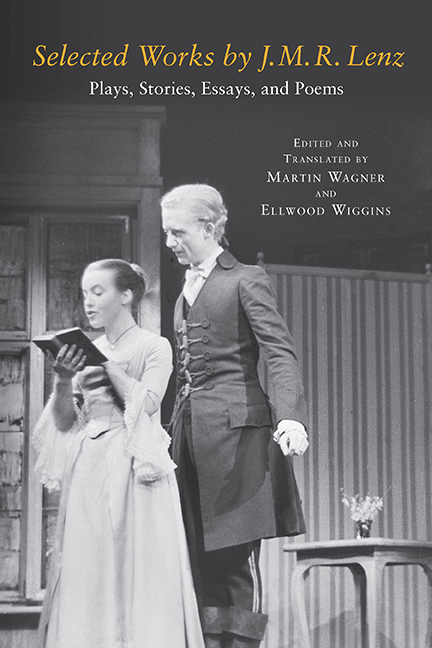Book contents
- Frontmatter
- Contents
- A Note on the Translation
- Introduction
- Part One Plays
- Part Two Stories
- Part Three Essays
- Remarks on the Theater
- On Götz von Berlichingen
- Review of The New Menoza: Written by the Author Himself
- On Scene Changes in Shakespeare
- On the Marriages of Soldiers
- Part Four Poems
- Chronology
- A Note on the Currencies in Lenz's Works
- Selected Bibliography
- Index
On Götz von Berlichingen
from Part Three - Essays
Published online by Cambridge University Press: 27 March 2020
- Frontmatter
- Contents
- A Note on the Translation
- Introduction
- Part One Plays
- Part Two Stories
- Part Three Essays
- Remarks on the Theater
- On Götz von Berlichingen
- Review of The New Menoza: Written by the Author Himself
- On Scene Changes in Shakespeare
- On the Marriages of Soldiers
- Part Four Poems
- Chronology
- A Note on the Currencies in Lenz's Works
- Selected Bibliography
- Index
Summary
We are born—our parents give us bread and clothing—our teachers press into our brain words, languages, and knowledge—some pleasant girl presses into our heart the desire to possess her for ourselves, to embrace her in our arms as our property, if indeed a downright animalistic urge isn't really involved—a slot opens up in the republic into which we fit— our friends, relatives, benefactors get to work and manage to shove us into it—we rotate for a while in this place like other wheels, and thrust and drive—until, if it runs properly, we are worn down and blunted and finally have to make space for a new wheel—that, gentlemen, without glorifying it, is our biography—and what is a human in the end if not an exquisite little artificial machine that fits better or worse into the big machine that we call the world, world events, the ways of the world?
No wonder philosophers philosophize in this way, if this is the way we live. But can we call that living? Can we call it feeling your existence, your independent existence, the spark of God? Ha! It has to be hiding in something better, the allure of life: because to be a ball in the hands of others is a sad, depressing thought, an eternal slavery, a merely more artificial animality—reasonable, but on that very account all the more miserable. What do we learn from this? This isn't meant to be a declamation, gentlemen; if your feelings don't tell you that I'm right, then I would curse all rhetorical arts that might incline you to my party without convincing you. What do we learn from this? We learn that acting, action is the soul of the world, not pleasure, not fine sentiment, not hair-splitting distinctions; that only by acting do we become like God, who unceasingly acts and unceasingly delights in his works. This is what we learn: that the force that works in us, our spirit, is our highest faculty, that it alone gives true life, true consistency, and true value to our body with all its sensuality and feelings; that without this spirit all our pleasure, all our feelings, all our knowledge are nothing but passive suffering [Leiden], nothing but death delayed.
- Type
- Chapter
- Information
- Selected Works by J. M. R. LenzPlays, Stories, Essays, and Poems, pp. 286 - 289Publisher: Boydell & BrewerPrint publication year: 2019



